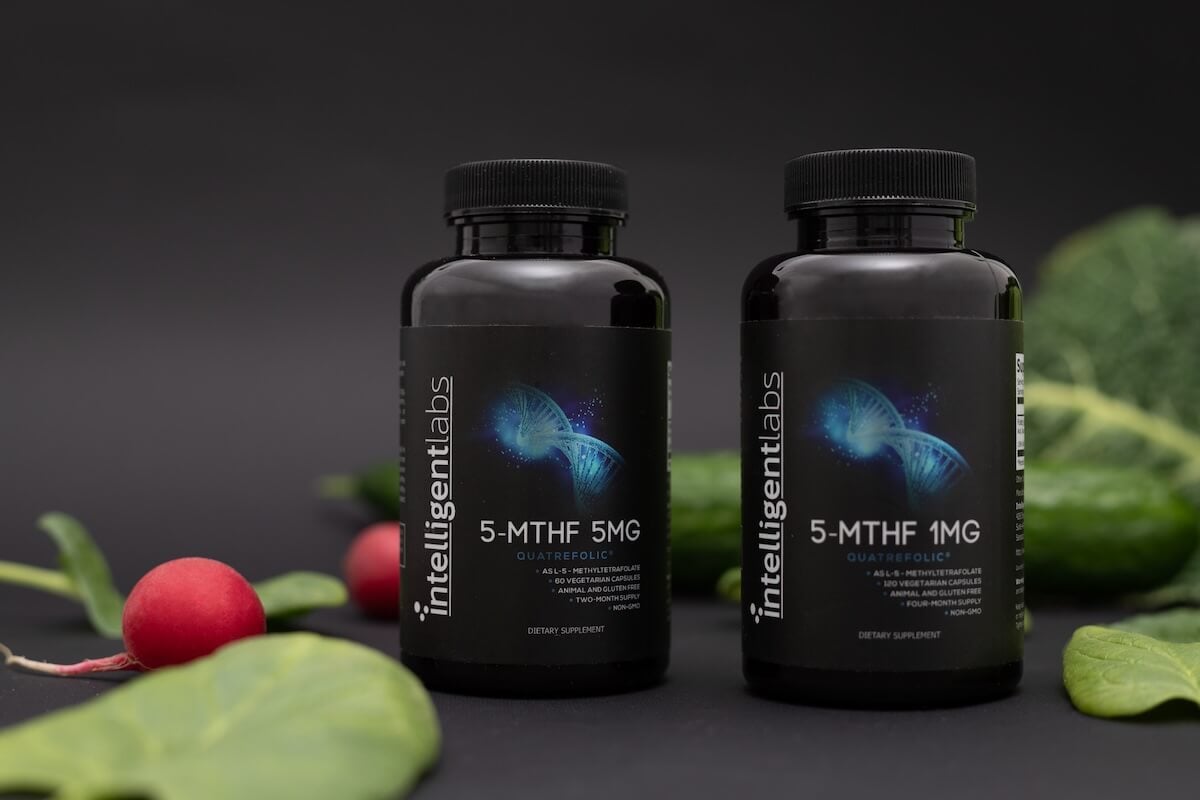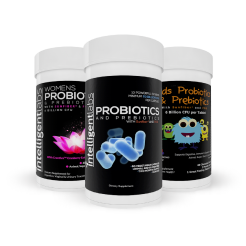Feeling low, foggy, or anxious? Folate (vitamin B9) might be the missing piece. But not all folate forms are equal. That’s why 5-MTHF, the active form, often works better than synthetic folic acid to fuel your brain and support your mood. Let’s see why!
Table of Contents
How Are Folic Acid and Depression Connected?
Depression isn’t just about brain chemicals, it can also be about nutrition. Your body needs folate to make key neurotransmitters like serotonin, dopamine, and norepinephrine, which affect mood and stress response.1
Dr. Vijayanand Pujari, our pharmaceutical scientist with over 10 years of experience in supplement formulation, breaks down why folate plays a key role in mood regulation:
People with low folate levels tend to experience more severe or longer-lasting depression, and may be at higher risk of relapse. Folate is crucial for producing mood-regulating chemicals, so if you’re deficient, it’s harder for your brain to stay balanced.
Getting enough folate – through diet or supplements like our 5-MTHF Activated Folic Acid – could be a straightforward way to support a healthier mood.2 3
Synthetic folic acid has to be converted into its active form, 5-MTHF, before the brain can use it. Many people (especially those with MTHFR gene variants) can’t convert folic acid efficiently. The unused folic acid builds up in the bloodstream as unmetabolized folic acid.3 So even if you’re supplementing, you might still be folate-deficient in practice.
Can Folic Acid or 5-MTHF Supplementation Help Reduce Depressive Symptoms?
According to Dr. Pujari, yes, supplementation can help:
Research suggests that supplementing with folic acid or 5-MTHF may help reduce depressive symptoms. 5-MTHF, in particular, has been studied both as a standalone treatment (monotherapy) and as an add-on to antidepressants (adjunct therapy).
5-MTHF has shown benefits for people with normal and low folate levels, older adults with dementia, and those with alcohol-related depression. Since low folate is linked to depression, getting enough can be a simple and effective way to support mental health.4
So, Why Is 5-MTHF Better for Depression Than Folic Acid?
If folic acid doesn’t always work, what makes 5-MTHF the better choice? It all comes down to bioavailability — how easily your body can use a nutrient. 5-MTHF is already “ready to go,” so you skip the conversion process entirely.
Researchers have found that methylfolate (5-MTHF) may improve depression symptoms, especially for those who don’t respond well to regular antidepressants. In fact, some psychiatrists even prescribe 5-MTHF alongside SSRIs to enhance their effects.5 6
Dr. Pujari shares his thoughts:
5-MTHF is often the better choice because it’s more bioavailable, meaning the body absorbs and uses it more efficiently. It’s especially helpful for people with MTHFR gene mutations or those taking medications that interfere with folate absorption (here’s a list).
While past concerns existed about folate masking vitamin B12 deficiency, 5-MTHF is generally well tolerated and may pose fewer risks than synthetic folic acid. 4

What’s the Right 5-MTHF Dosage for Depression?
Doses vary, depending on your needs, genetics, and current folate levels. In some studies, 7.5 mg to 15 mg per day was effective when taking 5-MTHF in addition to antidepressants.6 7
But many people don’t need that much. If you’re looking to support general mood and focus, a lower dose can help.
Try starting with our 1 MG 5-MTHF supplement if you’re new to methylfolate or prefer a gentler daily dose. Each bottle contains 120 capsules (enough for 120 servings or about 4 months). It features Quatrefolic®, a stable, highly bioavailable form made from non-shellfish Glucosamine salt.
If you need something stronger, we also offer a 5 MG 5-MTHF supplement (60 capsules, a two-month supply) with the same high-quality Quatrefolic®.
Both options are non-GMO and manufactured in an NSF GMP-certified facility in the United States, free from fillers, artificial flavors, and preservatives. Plus, every batch is third-party tested, so you know you’re getting exactly what’s on the label.
Tip: Always check with your healthcare provider before starting high-dose 5-MTHF, especially if you’re on antidepressants.
Can 5-MTHF Help With Postpartum Depression?
Postpartum depression (PPD) is more than the “baby blues.” It’s a serious mood disorder that affects many new mothers. Many factors contribute to PPD, including hormonal shifts, sleep deprivation, and genetic predisposition.8
Folate is essential for neurotransmitter balance and hormone regulation.3 Yet many prenatal supplements use synthetic folic acid, which might not be well-absorbed in mothers with MTHFR gene variants. While adequate folate alone won’t prevent PPD, ensuring proper levels with 5-MTHF may support brain health and recovery during the postpartum period.
Can You Take Too Much 5-MTHF?
5-MTHF is generally considered safe because it’s water-soluble, meaning your body excretes what it doesn’t use. That said, extremely high doses may cause side effects like irritability or sleep disruptions in sensitive individuals.9
High-dose folate (above 5 mg/day) may also mask a vitamin B12 deficiency by correcting anemia signs while the underlying B12 issue continues unnoticed.10
If you plan on taking more than 1–5 mg daily (especially if you’re pregnant, on prescription medications, or at risk for B12 deficiency), talk to your healthcare provider first. A quick check of your B12 status can help keep everything in balance.
Is It Possible For Folic Acid To Make Depression Worse?
If folate is good for your mood, can folic acid do the opposite? It’s a fair question. Some people take folic acid supplements expecting a mental boost, only to feel just as bad, or even worse!
When folic acid isn’t converted properly (which often happens with an MTHFR gene mutation), it accumulates instead of supporting the brain. This creates a “functional folate deficiency,” meaning you technically have folic acid in your body but NOT the usable 5-MTHF form. As a result, you may still feel sluggish, foggy, and low, even if you’re taking supplements.
If you’re unsure whether you have an MTHFR mutation, genetic testing can help determine how well your body processes folic acid. You can order an at-home DNA test (like 23andMe) or ask your doctor for a lab test.
Conclusion
When it comes to supplements for depression, 5-MTHF is a standout option. It bypasses common folic acid conversion issues, supports the production of key neurotransmitters, and can even enhance the effects of antidepressants.6 If you’ve tried synthetic folic acid without success, switching to 5-MTHF may make all the difference.


References:
- “The Folate Factor.” Psychology Today, 2025, www.psychologytoday.com/gb/articles/201901/the-folate-factor. ↩︎
- Bender, Ansley, et al. “The Association of Folate and Depression: A Meta-Analysis.” Journal of Psychiatric Research, vol. 95, 1 Dec. 2017, pp. 9–18, https://doi.org/10.1016/j.jpsychires.2017.07.019. ↩︎
- Liwinski, Timur, and Undine E. Lang. “Folate and Its Significance in Depressive Disorders and Suicidality: A Comprehensive Narrative Review.” Nutrients, vol. 15, no. 17, 1 Jan. 2023, p. 3859, www.mdpi.com/2072-6643/15/17/3859 ↩︎
- Fava, Maurizio, and David Mischoulon. “Folate in Depression.” The Journal of Clinical Psychiatry, vol. 70, no. suppl 5, Nov. 2009, pp. 12–17, https://doi.org/10.4088/jcp.8157su1c.03. ↩︎
- Ginsberg, Lawrence D, et al. “L-Methylfolate plus SSRI or SNRI from Treatment Initiation Compared to SSRI or SNRI Monotherapy in a Major Depressive Episode.” Innovations in Clinical Neuroscience, vol. 8, no. 1, 2011, p. 19, pmc.ncbi.nlm.nih.gov/articles/PMC3036555/. ↩︎
- Papakostas, George I., et al. “L-Methylfolate as Adjunctive Therapy for SSRI-Resistant Major Depression: Results of Two Randomized, Double-Blind, Parallel-Sequential Trials.” The American Journal of Psychiatry, vol. 169, no. 12, 1 Dec. 2012, pp. 1267–1274, pubmed.ncbi.nlm.nih.gov/23212058/ ↩︎
- “A Review Of .” Www.psychiatrist.com, 9 May 2023, www.psychiatrist.com/pcc/a-review-of-l-methylfolate-as-adjunctive-therapy-in-the-treatment-of-major-depressive-disorder/. ↩︎
- Mughal, Saba, et al. “Postpartum Depression.” National Library of Medicine, StatPearls Publishing, 2024, www.ncbi.nlm.nih.gov/books/NBK519070/. ↩︎
- Mayo Clinic Staff. “Folate (Folic Acid).” Mayo Clinic, 10 Aug. 2023, www.mayoclinic.org/drugs-supplements-folate/art-20364625. ↩︎
- Miller, Joshua W et al. “Excess Folic Acid and Vitamin B12 Deficiency: Clinical Implications?.” Food and nutrition bulletin vol. 45,1_suppl (2024): S67-S72. doi:10.1177/03795721241229503 ↩︎
 Free Shipping on all orders over $50
Free Shipping on all orders over $50





